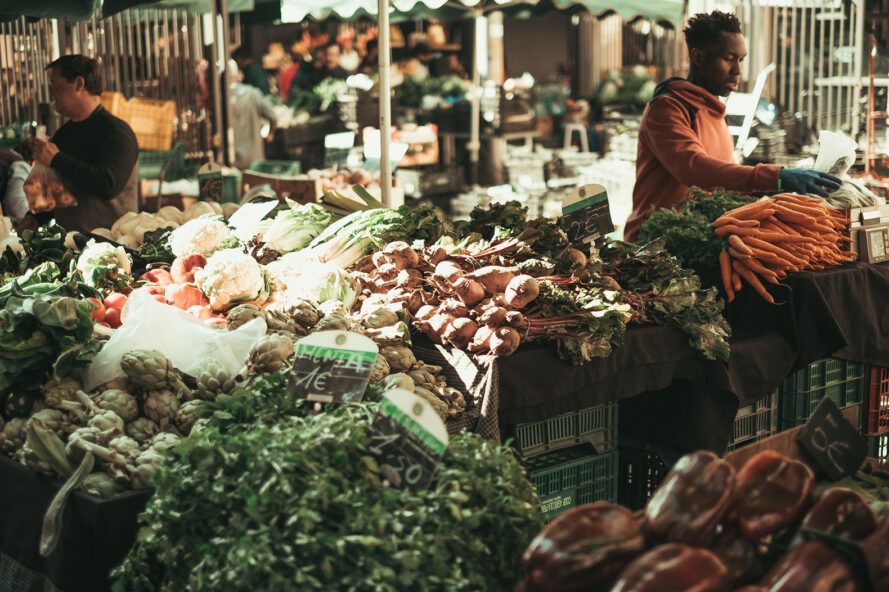You shop local and buy organic when you can, but how can you tell if your farmers market produce is really organic? There have been a few scandals in recent years where farmers market vendors were found to be purchasing and reselling grocery store produce labeled as locally grown. So how can you tell? Here’s how to find a great farmers market vendor or food co-op for organic produce.
Continue reading below
Our Featured Videos
Markers of organic produce
Many farms aren’t labeled organic even though they are, because it takes time and money and multiple inspections to be officially labeled organic. Some farms do go through this process for your reassurance, but many can’t afford it. You can get around this by asking your local farmers market vendors if they are organic or no-spray, and then asking the following questions to make sure it’s the truth:
- 1. Are you officially listed as an organic farm? Are some parts of your farm organic and others not? Why is that?
- 2. Are you no-spray, and do you use organic compost?
- 3. Do you ever source your produce from other vendors?
- 4. If I have food allergies or if I’m sensitive to pesticides, which products are the safest?
Related: Online farmers markets gain popularity during pandemic
Many farmers are happy to talk about their regenerative and no-spray farming methods, but just can’t officially call themselves organic. If you have chemical sensitivities, be sure to let them know. They might use a chemical pesticide on one crop because of pest pressure problems and can steer you away from that item. If they aren’t really selling organic produce or buy from other vendors to resell, you can likely get the truth out of them by asking about their farming methods.
No farmer would miss a chance to tell you all about their operations if you’re interested. If they’re not telling you the truth, they won’t know as much about organic farming methods if they haven’t invested the time to put these into practice.

Organic food co-ops
If you don’t have a farmers market near you, you can ask these same questions of your local bodega or organic food co-op. Many food co-ops are started by individuals like you who are sensitive to chemicals or have a lot of food allergies. You can often find great produce options through a local food co-op because they are ordering large quantities from an organic supplier and splitting the produce and meats and cheeses between a few dozen families. You can Google local food co-ops near you, or look at the following websites to find a food co-op in your area:
- – The USDA Farmers Market Directory
- – Local Food Directories
- – USDA Local CSA Finder
- – On-Farm Market Finder
- – Grocery Co-op Finder
- – Local Harvest CSA Finder
Many local homeschooling groups, holistic healer directories and chambers of commerce will also list local farms. If you have farms in your area that host agritourism events, you also might stumble on some fantastic on-farm markets. We have a local farm market grocery store near our house, plus several U-pick organic farms and a farmers co-op that hosts a local market monthly. The produce and other products can sometimes be pricey, but if you ask why you’ll learn about the superior quality and safety of organic produce plus a bunch of other yummy treats like homemade honeycomb, raw cheeses, homemade goats milk soap and more.
Small farms don’t need to be certified
The exception to the USDA organic rule where farmers need to be certified is when a farm nets less than $5,000 per year. Look around for what’s called micro-farms or farms on less than a few acres. Road-side farmers market produce stands are another great option, which you can find on roadside stands on farm properties or sometimes in parking lots at bigger strip malls where farmers host seasonal sales of flower and vegetable starts or sell off big seasonal crops of cherries, peaches, corn and watermelon.
We love finding new farm stands because the produce is super fresh, such as early season sweet corn. You probably need cash for these roadside stands that have a cash box, but if you find an on-farm market, you can usually use a credit card or QR code to pay or sign up for weekly or monthly subscription boxes.
Farms are increasingly switching over to products made from their on-farm produce and cash crops to make ends meet, so don’t be surprised if you find some amazing personal care products, jams, baked goods and gift items along with your organic produce. I don’t know about you, but I find that shopping at farmers markets and roadside stands in rural areas (or hippie towns like where I live) is a fantastic way to get started on gift shopping as well as find some of the best produce out there that is truly organic, local, farm-to-table.
Images via Pexels

